Visiting Residential Fellow
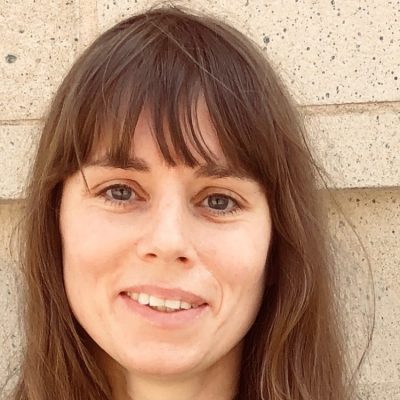
Jennifer Cazenave
“Lessons in Seeing: Disability and the Media Archive”
Jennifer Cazenave is an Associate Professor of French and Cinema & Media Studies at Boston University. Her first book, An Archive of the Catastrophe: The Unused Footage of Claude Lanzmann’s ‘Shoah’ (SUNY Press, 2019), offers a chronicle of overlooked aspects of the film’s making, while also framing broader questions about trauma and mediation, audiovisual testimonies, gendered memories, and digital archives. An Archive of the Catastrophe received an Honorable Mention for the 2020 Best First Book Award presented by the Society for Cinema & Media Studies. A French translation is forthcoming in 2026. Professor Cazenave’s research has been supported by such institutions as the ACLS, the United States Holocaust Memorial Museum, and Boston University Center for the Humanities. Her work has appeared in edited volumes, journals, and magazines including SubStance, Cinema Journal, and Los Angeles Review of Books. She will spend her fellowship year completing her second book project, Lessons in Seeing: Disability and the Media Archive (under contract with Columbia University Press). The book argues that media technologies have been actively involved in the construction and deconstruction of disability as a project of exclusion in the twentieth century. It centers on four case studies: (1) Nazi propaganda films; (2) home movies and snapshots in postwar France; (3) the “street tapes” of the early video revolution; and (4) Frederick Wiseman’s quartet on the Alabama Institute for Deaf and Blind.
Faculty Residential Fellows
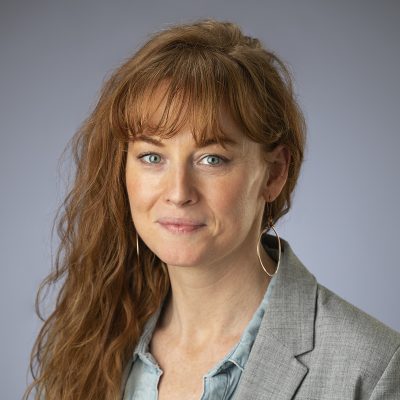
April Anson – JER Fellow
“Unfenceable: American Ecofascism, Literary Genre, and Native American Environmental Justice”
Dr. April Anson is an assistant professor of English and Social and Critical Inquiry at the University of Connecticut where she serves on the executive committees for American Studies and Native American and Indigenous Studies. Prior to joining UConn, Dr. Anson was assistant professor of Public Humanities at San Diego State University and a Mellon Postdoctoral Fellow at the University of Pennsylvania. Dr. Anson works at the intersection of environmental humanities, Indigenous American studies, and political theory. As the 2025–26 Justice, Equity and Repair Fellow at UCHI, Dr. Anson will complete her manuscript Unfenceable: Ecofascism, Literary Genre, and Native American Environmental Justice. Unfenceable uses literary analysis to trace the historical and ongoing relationship between climate change, white supremacy, and American environmental thought as well as the Indigenous American environmental justice traditions that eclipse those relations. Dr. Anson is cofounder of the Anti-Creep Climate Collective, coauthor of Against the Ecofascist Creep, and author of other public-facing work. Her research has appeared in boundary 2, Resilience, American Quarterly, Environmental History, Western American Literature, and more.

Peter Constantine
“Indigenous Language Reclamation: Reviving Extinct Languages”
Peter Constantine is professor of translation studies and director of the program in literary translation in the Department of Literatures, Cultures, and Languages at the University of Connecticut. He is the publisher of World Poetry Books and the literary magazine World Poetry Review. His translations include works by Rousseau, Machiavelli, Gogol and Tolstoy for Random House, Modern Library. He co-edited A Century of Greek Poetry: 1900–2000, and the anthology The Greek Poets: Homer to the Present, which W.W. Norton published in 2010. He is a Guggenheim Fellow, a recipient of two NEAs, and was awarded the PEN Translation Prize for Six Early Stories by Thomas Mann and the National Translation Award for The Undiscovered Chekhov. His translation of the complete works of Isaac Babel received the Koret Jewish Literature Award and a National Jewish Book Award citation. A heritage speaker of Corinthian Arvanitika, he is involved in translation and documentation efforts for this severely endangered language. His current project at the Humanities Institute is to complete a monograph titled Indigenous Language Reclamation, in which he investigates strategies used by indigenous communities throughout the world to reclaim their extinct heritage languages.
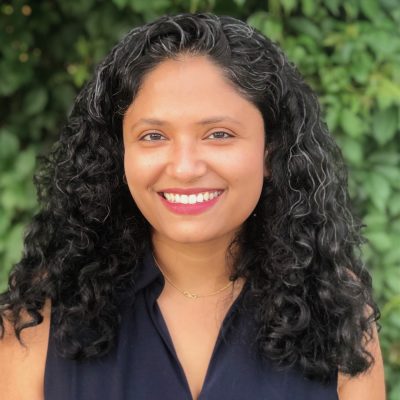
Nanjin Islam
“Recasting the Coolie: Racial Capitalism, Caste, and Indian Indentureship in the Caribbean”
Najnin Islam is Assistant Professor of English at the University of Connecticut. Her research focuses on post-emancipation labor economies in the Caribbean and the Indian Ocean world. Her work has been published in journals such as Small Axe, ARIEL, Interventions, Global South Studies, and Verge. She has also written for Adam Matthew Digital and a pedagogical essay of hers is forthcoming in the edited volume MLA Options for Teaching: Food in Literature. Her research has received support through the NEH and other institutional funding. During her time at the UCHI, she will work on her current book project that examines the entangled histories of race and caste in the Anglophone Caribbean after emancipation, particularly during the era of Indian indentureship. Through appositional readings of the historical archive of indentureship and contemporary literary-cultural productions that engage with this history, the book reflects more broadly on the implications of these connected histories for our understanding of racial capitalism in the Atlantic world.
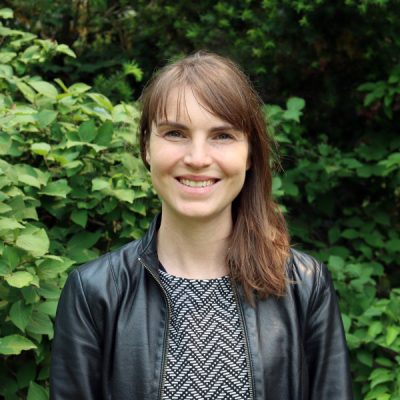
Julia Smachylo
“Silvic Stewardship: Incentivizing Environmental Care in the Northeast”
Julia Smachylo is a Canadian urban designer and planner, and an Assistant Professor of Landscape Architecture at the University of Connecticut. Julia’s research is grounded in critical urban and landscape theory, political ecology and media studies, and traces the rise of neoliberal forms of natural resource management that have set in motion larger aggregate impacts bearing direct relation to environmental conservation, ecological design, and the organization of cities. Working across disciplines, her research connects urban landscapes with multi-scalar processes of environmental stewardship, with the goal of contributing to ongoing efforts to generate more holistic and socially responsible approaches to planning and design intervention. In addition, an essential component of her research engages with media practice and design research through mapping, drawing and video installation. Recent publications include Legible Landscapes: Incentivizing Forest Knowledge and Action in Southern Ontario (2024) and Exploratory Vertical Studio in Landscape Architecture: Building Connection through Peer-to-Peer Design Research (2024). Julia is also engaged in service-based learning activities, competitions, and design research, which further informs her scholarly practice. Current research projects focus on post-capitalism, fallow landscapes, incentivized management, and visualizing forest systems.
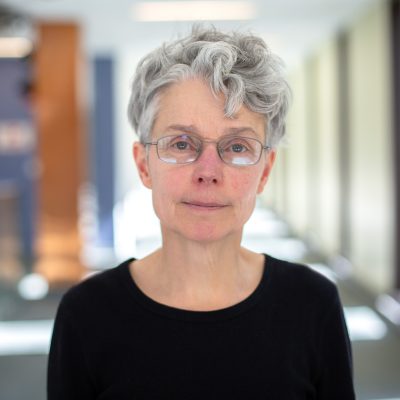
Fiona Somerset
“Silence is Consent: The Idea of Complicity in the Middle Ages”
Fiona Somerset is Professor of Comparative Literary and Cultural Studies as well as Social and Critical Inquiry at the University of Connecticut, where she has served as Codirector of Comparative Literary and Cultural Studies and Interim Director of Women’s, Gender, and Sexuality Studies. She is finishing work on a book on the medieval history of consent through silence, and preparing to write another book on personhood in the Middle Ages. Her most recent article “Lady Mede as Entrepreneurial Woman” (Exemplaria, 2024) contributes to a revised understanding of the legal, political, and economic theories that have historically granted personhood to some while denying it to others. She has written and/or edited Clerical Discourse and Lay Audience in Late-Medieval England (Cambridge, 1998), Four Wycliffite Dialogues EETS 333 (Oxford, 2009), and Feeling Like Saints: Lollard Writings after Wyclif (Cornell, 2014, winner of the Margaret Labarge Prize). Her collaborative projects include Wycliffite Spirituality (Paulist, 2013), four edited volumes on vernacularity (2003), the influence of lollardy (2003), medieval media (2015), and objects of belief (2025) and a colloquium in Studies in the Age of Chaucer on Historicizing Consent (2022), as well as the Brill Companion to Lollardy (2016). She has served as editor of the Yearbook of Langland Studies and Director of the International Piers Plowman Society. Her interest in the interface between intellectual thought and popular culture has led her to interdisciplinary research on medieval heresy and political thought, the history of emotions, popular media, political poetry, and most recently, law and literature.

Kathleen Tonry – Faculty Success Fellow
“Time, Work, and Texts in Fifteenth-Century England ”
Kathleen Tonry is Associate Professor of English at the University of Connecticut. Her work as a medievalist focuses on the history of premodern book, and especially on the intertwined transitions in literary and material textual histories that took place over the fifteenth century. She has published on premodern forms of history-writing, the place of leisure in an early treatise on fishing, and on the formal tensions evident in writing across the fifteenth century. In her first book, Agency and Intention in English Print, 1476–1526, she argues that the long period of the pre-Reformation press is underrecognized for the innovative moral, ethical and cultural commitments expressed through the new forms of print. Her work has won an NEH grant and the Beatrice White prize. From 2005–2024, she was also the Associate Director of UConn’s Writing Center, where she developed and oversaw the Racism in the Margins initiative; in 2023, she was a Visiting Scholar with Harvard’s Medieval Studies Program. Over the next year, she will be exploring the quirky, innovative traditions of time-telling texts in late-medieval England, pursuing the ways that bookmakers grappled with rapid, concurrent changes in media technologies, definitions of work, and time-keeping knowledge. This past moment provides some provocations for us, she suggests, as we meet our own vexing intersections of AI, labor, and shifting temporalities.

Harry van der Hulst
“Why are Sign Languages Real Languages?”
Harry van der Hulst (PhD 1984, Leiden University, Netherlands) specializes in phonology (of spoken and signed languages). He has published 5 books, over 180 articles, (co-)edited 32 books and 6 journal theme issues, among them The Oxford Handbook of Vowel Harmony (with Nancy Ritter) in 2024. He is Editor-in-Chief of The Linguistic Review. He is professor of linguistics at the University of Connecticut. His most recent books include, Asymmetries in Vowel Harmony – A Representational Account (Oxford, 2018); Radical CV Phonology – A Theory of Segmental and Syllabic Structure (Edinburgh, 2020), A Mind for Language (Cambridge, 2024) and Genes, Brains and Evolution (Cambridge, forthcoming).
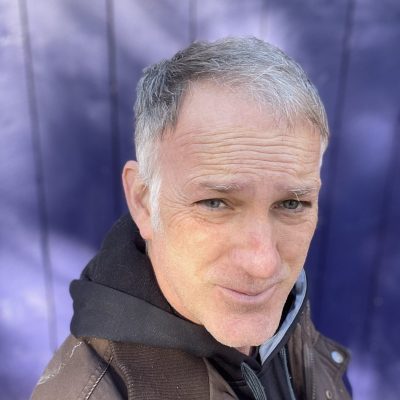
Chris Vials
“Authoritarian Agency: The Far Right and US Culture”
Chris Vials is a Professor in English and the School of Social and Critical Inquiry at the University of Connecticut. He is the author of Haunted by Hitler: Liberals, the Left, and the Fight against Fascism in the United States (2014) and Realism for the Masses: Aesthetics, Popular Front Pluralism, and US Culture, 1935-1947 (2009). He is also the editor, with Bill Mullen, of The US Antifascism Reader, published by Verso Press in 2020, and the sole editor of American Literature in Transition: 1940-1950 (Cambridge, 2017).
He has appeared in numerous media venues in the US and Canada to speak on fascism in the United States, past and present, including National Public Radio, PBS, the CBC, and Jacobin magazine. Vials is currently working on a history of far-right movements in the United States from the 1920s to the present in comparative perspective, paying particularly close attention to their relationships to liberal democracy and to violence. At the University of Connecticut, he served as the President of the UConn-AAUP in 2024–2025 and the Director of American Studies from 2015–2022.
Dissertation Research Scholars
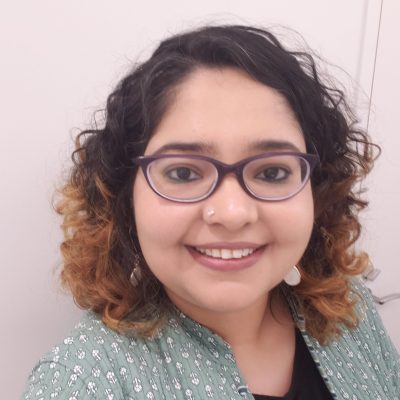
Asmita Aasaavari
“Who Will Take Care of Me? Aging and Care in Northeast Connecticut”
Asmita Aasaavari is a Ph.D. candidate in the department of sociology at UConn. Her scholarly interests lie at the intersection of feminist gerontology, the sociology of care work, gender, and the political economy of aging. In her research, she uses interdisciplinary methods, and feminist, and sociological lenses to shed light on how aging and the social organization of care intersect with systems of inequality such as race, class, gender, disability and caste. In her dissertation, Asmita studies the interactions of social mobility, cultural norms, gender, and family forms in shaping aging, particularly among underserved communities. Her research and teaching have been recognized and funded by American Sociological Association, Social and Economic Rights Association, The Hastings Center, UConn Human Rights Institute, Wood Raith Living Trust, among others. Most recently, she was a finalist for the Center for Engaged Scholarship’s prestigious doctoral fellowship. As a feminist sociologist in training, Asmita is passionate about bridging teaching, scholarship, and activism, serving not only students, universities, and disciplines, but also communities and the larger social world. Professionally beyond academia, she has worked with social science research institutions in India in the fields of gender, education, poverty alleviation, politics, and democracy and volunteered with rights-based social movements. She has served on the executive board of the UConn Graduate Employee Union. Currently, she is working with UConn Center on Aging on applied research on dementia, aging, and home and community-based services in Connecticut.
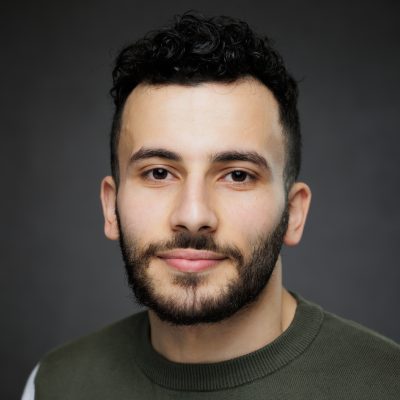
Ahmed AboHamad
“Reconceptualizing Virtue Under Systemic Oppression”
Ahmed AboHamad is a Ph.D. candidate in Philosophy at the University of Connecticut. He graduated summa cum laude with honors from Connecticut College, where he majored in Biological Sciences and Philosophy. At UConn, he earned his M.A. in Philosophy in 2023 and completed graduate certificates in Human Rights and in Intersectional Indigeneity, Race, Ethnicity, and Politics (IIREP). His dissertation examines the liberatory potential—and the limits—of inward-looking philosophies: those that assume we already have, within ourselves, everything necessary for flourishing. Focusing on Stoicism and Sufism, he critiques contemporary misuses of these traditions, especially the neoliberal self-help industry’s misuse of Stoicism and the way authoritarian regimes have instrumentalized Sufism as a supposed antidote to religious or political extremism. His work is part of a broader effort to rethink how we should understand virtue and flourishing under conditions of structural injustice, and to explore how philosophical traditions shape our sensibilities and responses to oppression.

Catalina Alvarado-Cañuta – Richard Brown Dissertation Fellow
“Mapuche Creative Spirits: Collective Healing of the Colonial Trauma of Wallmapu. ”
Catalina Alvarado-Cañuta is a Fulbright scholar of Mapuche origin who is currently a PhD candidate in Medical Anthropology at the University of Connecticut. She began her specialization in the field as a master's student at the Centro de Investigaciones y Estudios Superiores en Antropología Social (CIESAS), Mexico, where she obtained her degree in Social Anthropology. Catalina has worked in public service as a manager of health programs for the indigenous population in Chile, and has conducted research in this area. Prior to studying in the United States, Catalina worked as an academic at universities in Chile, where she focused on issues related to culture, social identities, and public policy. Alvarado-Cañuta’s main focus is on colonial trauma and the processes of collective healing of indigenous peoples, and indigenous art as a decolonial methodology. Her latest co-authored work is the chapter “Trig Metawe: Restoring the cracks of dispossession for Küme Mongen,” in which she and Mapuche artist Francisco Huichaqueo analyze the plundering of Mapuche archaeological heritage (they call them prendas de memoria) distributed among museums in Chile and around the world as part of the processes that generate Colonial Trauma and how its possible restitution or accompaniment to Mapuche archaeological heritage contributes to the restitution of the collective well-being of Mapuche people. She is currently a member of the Buen Vivir and Collective Healings Initiative, a research group that uses participatory action methodologies led by Dr. César Abadía-Barrero at the University of Connecticut. Catalina has recently taken on the role of Co-Coordinator of the Abiayala Working Group section of the Native American and Indigenous Studies Association NAISA.
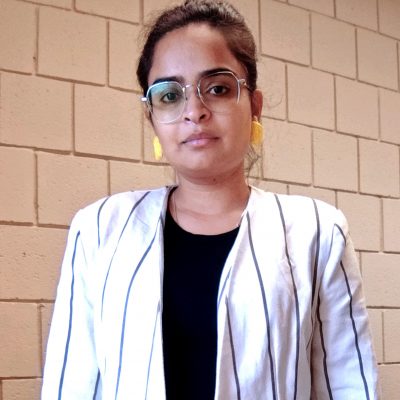
Ashmita Mukherjee
“Textual Pleasures: Literature of Amusement in Post/Colonial India (1850–1950)”
Ashmita Mukherjee is a doctoral candidate in Comparative Literary and Cultural Studies. Her doctoral project is titled “Textual Pleasures: Literature of Amusement in Post/Colonial India (1850-1950).” She reads Anglophone, Hindi-Urdu, and Bengali texts as active participants in global transcultural dialogues, and as emotive driving forces behind cosmopolitan modernity as well as nationalist awakening in the Indian subcontinent. Her broad interests include postcolonial literature and culture, theories of affect, global Victorian studies, imagetextual
media, adaptation studies, and literary translation. She has published scholarly articles and reviews in journals including South Asian Review, Literature/Film Quarterly, and ARIEL: A Review of International English Literature; has won the Midwest Victorian Studies Association Arnstein Prize 2023 for doctoral project, and World Poetry Books Graduate Award for Literary Translation 2023; and has a Certificate in Literary Translation.
Undergraduate Research Fellows
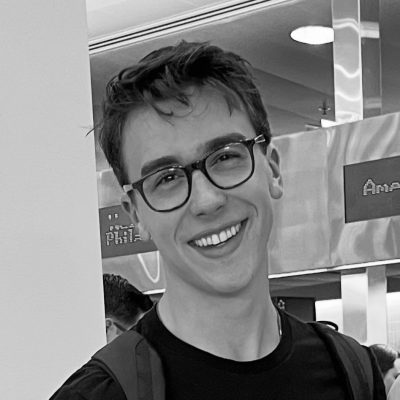
Nicholas Borgesi
“Deconstructing ‘Good’ English in Higher Education: Linguistic Injustice, Decolonization and a Case for Increased Accessibility”
Project advisor: Manuela Wagner
Nicholas Borgesi is a third-year undergraduate student in the Department of Linguistics. He has served as an intern at The American Place, which provides English as a second language and digital literacy education, career training and legal counseling for immigrants and refugees in Greater Hartford. He has worked with international students at Doane Family Enterprises LP McDonald’s in the role of International Talent Manager and as an intern at the English Language Center at Drexel University. Since December 2023, he has been an Instructional Specialist at the University of Connecticut American English Language Institute (UCAELI). In his project, “Deconstructing ‘Good’ English in Higher Education: Linguistic Injustice, Decolonization and a Case for Increased Accessibility,” Nicholas will explore the experiences of non-native and non-standard English speakers in academic settings and scrutinize the roles of such campus entities as the intensive English program and the writing center.
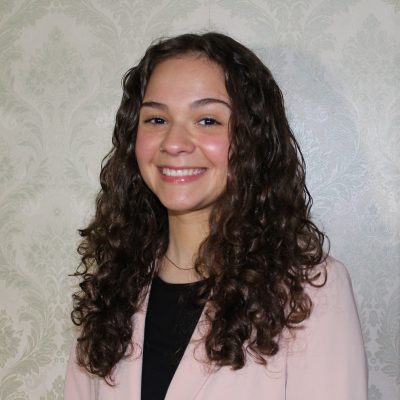
Josephine Burke
“Higher Education in Prison: Censorship, the Carceral State, and the Neoliberal University ”
Project advisor: Sandy Grande
Josephine Burke is a junior honors student from Naugatuck, CT, majoring in Political Science and Human Rights and minoring in History. Her research experience includes working as a Political Science Honors Bennett Research Assistant on the Tribal Educational Initiative, where she studied the demand and need for a Native-Serving College or University on the East Coast, interning with the Connecticut Sentencing Commission at the UConn Institute for Municipal & Regional Policy, where she explored the intersections between the criminalization of individuals with mental health and substance use disorders, housing, and reentry, and completing a summer research project under the UConn IDEA Grant. Josephine is also a Nutmeg Scholar, a member of the UConn Scholars Collective, and works as an Honors Guide for Peer Success. In her free time, she enjoys going to the gym, reading, and spending time with her family.
For her fellowship project, Josephine will examine how censorship and other conditions in prison affect incarcerated individuals’ experiences and the practices of prison educators in college prison education programs and question how these experiences inform the relationship between the carceral system and the university. During the summer of 2025, under the UConn IDEA Grant, Josephine conducted an extensive literature review on the influence of censorship and other contraints on higher education in prison and a taxonomy of the higher education in prison programs in Connecticut to gain insight into how the goals and course offerings of Connecticut HEP programs compare to justifications and desired outcomes within the literature. Building on her IDEA Grant project, during the academic year she will conduct interviews with formerly incarcerated individuals who have participated in higher education in prison as well as prison educators to gain a deeper understanding of censorship and other conditions in carceral settings that impact prison education and on the experience of engaging in HEP. This research aligns with her broader interests in the carceral system and the politics of the university.
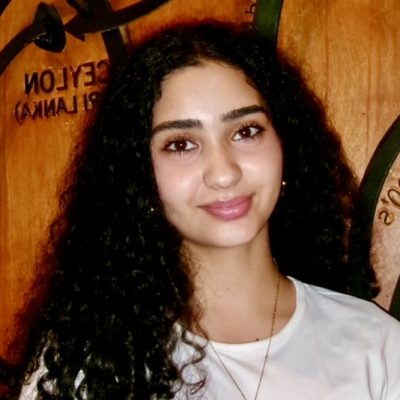
Suleen Kareem
“Gendered Resistance in Genocide: Women’s Histories of Survival and Activism in the Middle East”
Project advisors: Brendan Kane & Nana Amos
Suleen Kareem is a junior at the University of Connecticut, double majoring in Philosophy and Human Rights. She is the daughter of Kurdish refugees who fled northern Iraq and settled in the United States after surviving mass displacement, executions, and chemical attacks during the Anfal Campaign. These experiences have shaped Suleen’s scholarly interests and commitments, especially to refugee advocacy and the preservation of marginalized histories. She currently works as a coordinator at Elena’s Light, a nonprofit supporting Middle Eastern refugee women and children in New Haven, Connecticut, and hopes to pursue a J.D. to continue advancing justice for displaced communities. Her UCHI fellowship project explores how Armenian, Kurdish, and Yazidi women have resisted genocide through survival, activism, and the preservation of cultural memory. Drawing on theories of epistemic injustice and feminist thought, her research aims to highlight the gendered dimensions of genocide, focusing on voices that have been historically excluded from mainstream narratives.
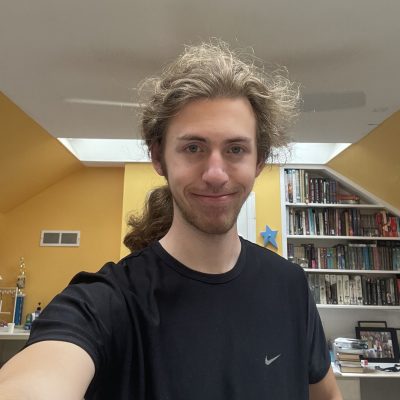
Autumn Scott
“Trinities in World Mythology: How and Why Geographically Separate Cultures Construct the Same Cosmology”
Project advisor: Robert J. Hasenfratz
Autumn Scott is a rising junior at UConn, majoring in history, with a focus on the medieval and early modern eras. Scott’s research interests include the reasons behind commonalities in world mythology, cultural interactions between different people groups, and the tactics and strategy of medieval military history. He plans on pursuing a master’s degree in the medieval studies program, followed by a PhD centered around the emergence of gunpowder in the west in the 1400s. His fellowship project, “Trinities in World Mythology: How and Why Geographically Separate Cultures Construct the Same Cosmology” aims to address the reasons behind why cultures which are in other ways sharply distinct from one another construct similar ways of thinking of the universe in their mythology, with triple deities and three-world cosmology. As a whole, the project is designed to examine the nuance between geographically separate cultures developing similar ways of thinking about the world.

